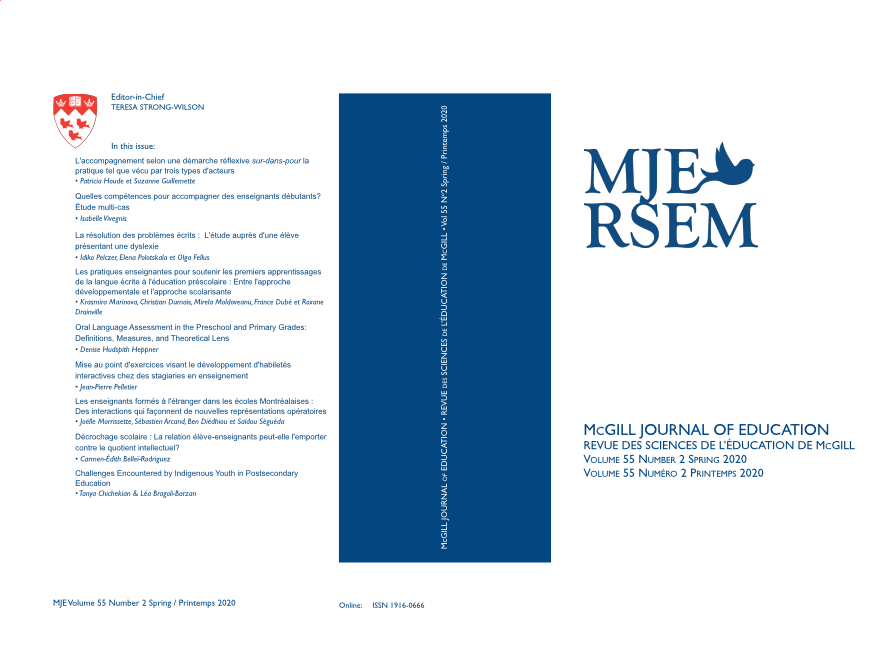Decolonizing Educational Practices through Fostering Ethical Relationality in an Urban Indigenous Classroom
Keywords:
Indigenous education, decolonizing education, ethical relationality, wîcihitowin and wahkohtowinAbstract
To foster the success of young Indigenous learners, our study partnered with an urban Indigenous school in Alberta’s capital region. This paper explores the decolonizing practices that emerged through the ethical relationships developed with students and staff guided by the Cree wisdom teachings of wîcihitowin and wahkohtowin. A group of Indigenous and Canadian university and school-based co-researchers worked with a class of students over four years (from grade 6 to 9) incorporating Indigenous knowledges with the mandated Social Studies curriculum. The teachings included Cree language, land-based activities, ceremony and story. Students expressed appreciation for the teachings and the opportunities they had experienced over the course of the study; it was a small step towards decolonizing education.
References
Alfred, T. (2005). Wasase: Indigenous pathways to action and freedom. Broadview Press.
Assembly of First Nations. (2011). First Nation elementary and secondary education: A discussion guide. Assembly of First Nations. Retrieved from: https://www.afn.ca/uploads/files/education/11-10-31_fn_education_-_a_discussion_guide_final.pdf
Battiste, M. A. (1998). Enabling the autumn seed: Toward a decolonized approach to Aboriginal knowledge, language, and education. Canadian Journal of Native Education, 22(1), 16-27.
Battiste, M. A. (2013). Decolonizing education: Nourishing the learning spirit. Purich.
Battiste, M., & Henderson, J. (2009). Naturalizing Indigenous knowledge in Eurocentric education. Journal of Native Education, 32(1), 5-18.
Cajete, G. (1994). Look to the mountain: An ecology of Indigenous education. Kivaki Press.
Corntassel, J. (2012). Re-envisioning resurgence: Indigenous pathways to decolonization and sustainable self-determination. Decolonization: Indigeneity, Education & Society, 1(1), 86-101.
Donald, D. (2016). From what does ethical relationality flow? An Indian Act in three artifacts. In J. Seidel & D. W. Jardine (Eds.), The ecological heart of teaching: Radical tales of refuge and renewal for classrooms and communities (p. 10-16). Peter Lang.
Edwards, K., Lund, C., & Gibson, N. (2008). Ethical validity: Expecting the unexpected in community-based research. Pimatisiwin: A Journal of Aboriginal and Indigenous Community Health, 6(3), 17-30.
Ermine, W. (2007). The ethical space of engagement. Indigenous Law Journal, 6(1), 193-203.
Hare, J., & Pidgeon, M. (2011). The way of the warrior: Indigenous youth navigating the challenges of schooling. Canadian Journal of Education, 34(2), 93-111.
Kanu, Y. (2007). Increasing school success among Aboriginal students: Culturally responsive curriculum or macrostructural variables affecting schooling? Diaspora, Indigenous, and Minority Education, 1(1), 21-41. https://doi.org/10.1080/15595690709336599
Littlebear, L. (2009). Naturalizing Indigenous knowledge: Synthesis paper. Canadian Council on Learning’s Aboriginal Learning Centre. Retrieved from: https://www.afn.ca/uploads/files/education/21._2009_july_ccl-alkc_leroy_littlebear_naturalizing_indigenous_knowledge-report.pdf
Michell, H. (2011). Working with elders and Indigenous knowledge systems: A reader and guide for places of higher learning. JCharlton Pub.
Munroe, E. A., Lunney Borden, L., Murray Orr, A., Toney, D. & Meader, J. (2013). Decolonizing Aboriginal education in the 21st century. McGill Journal of Education, 48(2), 317-337.
Nielsen, T. W. (2010). Lost in translation? Rethinking First Nation education via LUCID insights. International Review of Education, 56(4), 411-433.
Rahman, K. (2013). Belonging and learning to belong in school: The implications of the hidden curriculum for indigenous students. Discourse: Studies in the Cultural Politics of Education, 34(5), 660-672. DOI: 10.1080/01596306.2013.728362
Sheridan, J. W. & Longboat, D. R. (2014). Walking back into creation: Environmental apartheid and the eternal – Initiating an Indigenous mind claim. Space and Culture, 17(3), 308- 324.
Simpson, L. (2011). Dancing on our turtle’s back: Stories of nishnaabeg re-creation, resurgence and a new emergence. ARP Books.
Smith, L. T. (1999). Decolonizing methodologies: Research and Indigenous peoples. Zed.
St. Denis, V. (2009). Rethinking culture theory in Aboriginal education. In C. Levine-Rasky (Ed.) Canadian perspectives on the sociology of education (pp. 163-182). Oxford University Press.
Wilson, S. (2008). Research is ceremony: Indigenous research methods. Fernwood.
Downloads
Published
Versions
- 2021-09-02 (2)
- 2021-07-11 (1)
How to Cite
Issue
Section
License
Copyright (c) 2021 McGill Journal of Education / Revue des sciences de l'éducation de McGill

This work is licensed under a Creative Commons Attribution-NonCommercial-NoDerivatives 4.0 International License.



